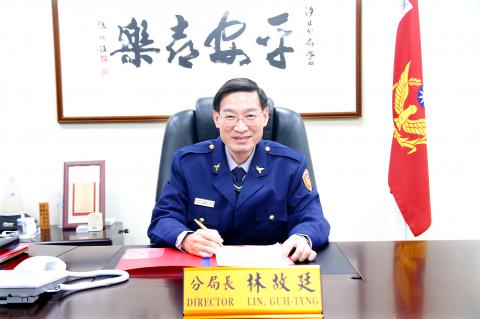The nation’s leading polygraph specialist, Lin Ku-ting (林故廷), said he last year became chief of the New Taipei City Police Department’s Sijhih Precinct (汐止) to help introduce forensic technology to police work.
Lin, a US-trained polygraph technician, played a role in the investigation into sabotage of the Taiwan Railways Administration’s South Link Line from 2004 to 2006 and the Mama Mouth Cafe double homicide in 2013.
He also worked on the department’s analytical tool that cross-references forensic evidence, for which he last year received the Executive Yuan Award for Outstanding Contributions in Science and Technology.

Lin said that he developed an affinity for polygraphic work while studying at the Central Police University, which led then-National Police Administration forensic science director Wong Ching-hui (翁景惠) to send him to the US to obtain a license, making him one of the nation’s first polygraph technicians.
Working closely with US experts as a crime scene investigator, he was able to integrate polygraph technology into Taiwanese law enforcement, which has been a boon to criminal investigations, he said.
Modern lie-detection methodology has contributed to the successful resolution of several high-profile cases, Lin said.
Polygraph tests have prevented wrongful convictions, such as clearing of suspicion several airmen who were wrongfully accused of stealing weapons from an armory in Taoyuan in 1999, he said.
During the hunt for the South Link Line saboteurs, he told police to release a male suspect surnamed Hsieh (謝) after polygraphs suggested his innocence, which angered detectives, Lin said.
However, as investigators later identified the culprits, the detectives’ attitude changed from hostility and anger to gratitude, he said.
In 2016, Lin was appointed director of the department’s forensic science center, where he headed the creation of the analytical tool that utilizes databases and surveillance footage to solve crimes.
Last year, he transferred to the Sijhih Precinct to become its chief.
The field of forensic science needs new blood, he said.
“I want to integrate public security and traffic data from the front lines and bring change to policing. As police increasingly depend on scientific methods, experts should take their knowledge to the streets,” Lin said.
He is also giving anti-drug speeches at schools and inviting junior court judges to talk with teachers and students, he said.
Reducing the barriers between law enforcement and school campuses is an urgent task for anti-drug efforts, he added.

Eight restaurants in Taiwan yesterday secured a one-star rating from the Michelin Guide Taiwan for the first time, while three one-star restaurants from last year’s edition were promoted to two stars. Forty-three restaurants were awarded one star this year, including 34 in Taipei, five in Taichung and four in Kaohsiung. Hosu (好嶼), Chuan Ya (川雅), Sushi Kajin (鮨嘉仁), aMaze (心宴), La Vie by Thomas Buhner, Yuan Yi (元一) and Frassi in Taipei and Front House (方蒔) in Kaohsiung received a one-star rating for the first time. Hosu is known for innovative Taiwanese dishes, while Chuan Ya serves Sichuan cuisine and aMaze specializes

Taitung County is to launch charter flights to Malaysia at the end of this year, after setting up flights to Vietnam and Thailand, the Taitung County Government said yesterday. The new charter flight services, provided by low-cost carrier Batik Air Malaysia, would be part of five-day tour packages for visits to Taitung County or Malaysia. The Batik Air charter flight, with about 200 seats, would take Malaysian tourists to Taitung on Dec. 30 and then at 12:35pm return to Kuala Lumpur with Taiwanese tourists. Another charter flight would bring the Taiwanese home on Jan. 3 next year, arriving at 5:30pm, before taking the

Taiwan High Speed Rail Corp. (THSRC) plans to ease strained capacity during peak hours by introducing new fare rules restricting passengers traveling without reserved seats in 2026, company Chairman Shih Che (史哲) said Wednesday. THSRC needs to tackle its capacity issue because there have been several occasions where passengers holding tickets with reserved seats did not make it onto their train in stations packed with individuals traveling without a reserved seat, Shih told reporters in a joint interview in Taipei. Non-reserved seats allow travelers maximum flexibility, but it has led to issues relating to quality of service and safety concerns, especially during

STATS: Taiwan’s average life expectancy of 80.77 years was lower than that of Japan, Singapore and South Korea, but higher than in China, Malaysia and Indonesia Taiwan’s average life expectancy last year increased to 80.77 years, but was still not back to its pre-COVID-19 pandemic peak of 81.32 years in 2020, the Ministry of the Interior said yesterday. The average life expectancy last year increased the 0.54 years from 2023, the ministry said in a statement. For men and women, the average life expectancy last year was 77.42 years and 84.30 years respectively, up 0.48 years and 0.56 years from the previous year. Taiwan’s average life expectancy peaked at 81.32 years in 2020, as the nation was relatively unaffected by the pandemic that year. The metric